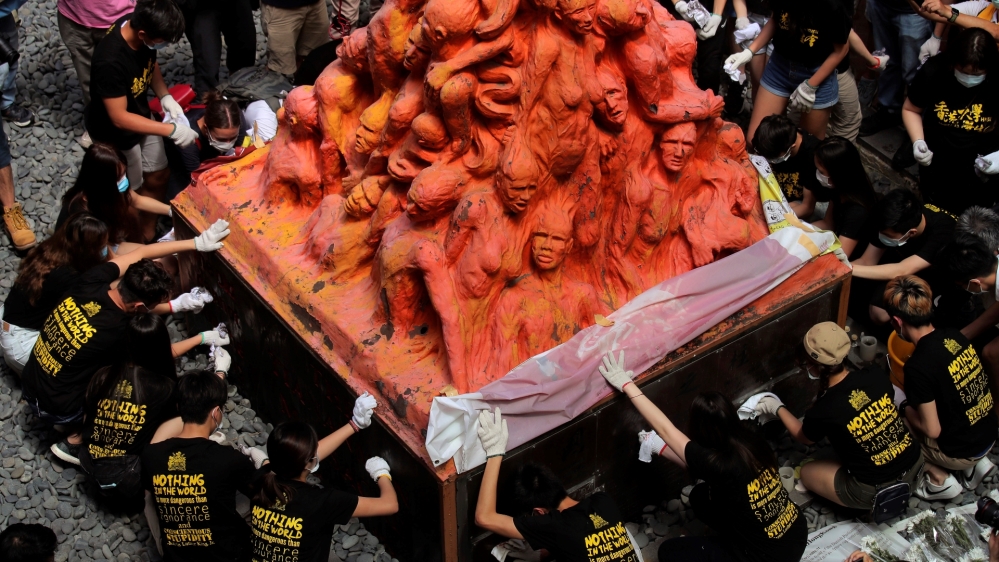Police and firefighters entered Hong Kong’s legislature on Thursday after two pro-democracy legislators threw foul-smelling liquid to protest against China’s “murderous” crackdown by Chinese troops in and around Tiananmen Square 31 years ago.
Eddie Chu and Ray Chan rushed to the front of the chamber during a debate over a controversial bill that would criminalise disrespect of China’s national anthem, splashing the reeking fluid as guards grappled with them. Police and firefighters later arrived on the scene.
“A murderous state stinks forever. What we did today is to remind the world that we should never forgive the Chinese Communist Party for killing its own people 31 years ago,” Chu said later, before he and Chan were removed from the chamber.
A final vote on the bill is expected later on Thursday with people in Hong Kong set to commemorate the bloody 1989 crackdown by lighting candles across the city.
For the first time, police have banned an annual vigil to mark the event that is usually held in downtown Victoria Park, citing the coronavirus outbreak. Some 3,000 riot police – 2,000 of them on Hong Kong Island where government offices are located – were deployed, while two water cannon were also stationed near the government complex and the Chinese liaison office, according to local media.
Vigil organisers have urged people to light candles in groups of no more than eight people to remain within the coronavirus rules on gatherings. The event has traditionally drawn tens of thousands of people to Victoria Park.
“The Hong Kong vigil has been a beacon of light for those of us struggling in darkness to keep the history and memory (of Tiananmen) alive,” Rowena He, an associate professor in history at the Chinese University of Hong Kong and author of Tiananmen Exiles: Voices of the Struggle for Democracy in China told Al Jazeera.
“It shows the world and the regime that there’s something that cannot be crushed with tanks and guns and jail, and that’s the human spirit.”
Calls online have urged people to light candles in specific places throughout the evening and then “where you are” at 8pm local time (12:00 GMT), followed by a minute of silence. Some have said they will go to Victoria Park in smaller groups.
“Police will observe and enforce the law as the situation requires,” the South China Morning Post quoted an unnamed high-ranking officer as saying.
Some people gathered to light candles on Wednesday night, while others held aloft neon lights depicting the date of the crackdown in Roman numerals.
Speaking up
Police have said a mass gathering on June 4 would pose a threat to public health at a time when the city has reported its first locally-transmitted coronavirus cases in weeks. Hong Kong has banned gatherings of more than eight people, a public health measure authorities insist has no political motivation.
Malissa Chan, a 26-year-old who works in the property sector, told Reuters she would go to the park anyway.
“When authorities want to suppress us, there are more reasons to speak up,” she said.
Social distancing measures allow for religious gatherings under certain conditions, so some people plan to commemorate the Tiananmen crackdown in churches and temples. Other residents are also expected to lay flowers along a waterfront promenade, while some artists plan to stage short street theatre plays.
Today we commemorate the protesters who fought for democracy in Tiananmen Square, scores of whom were violently repressed by the CCP. For the first time, Hong Kong's June Fourth vigil has been banned by the government. Defiantly, we commit to remembrance as a form of resistance. https://t.co/bd7WVdjhdx
— Lausan 流傘 🍉 (@lausanhk.bsky.social) (@lausanhk) June 4, 2020
China has never provided a full accounting of the 1989 violence, but rights groups and witnesses say thousands of people died when the military cleared the square of pro-democracy protesters who had been camped out there for weeks.
The death toll given by officials days after the crackdown was about 300, most of them soldiers, with only 23 students confirmed killed.
The event has been all but erased from history in mainland China, with Hong Kong’s vigil the most significant commemoration of the massacre anywhere in the world.
The ban means it is the first time since 1990 that it has not taken place.
Tensions in Hong Kong have ramped up after Beijing gave the green light last week to move ahead with national security laws to tackle secession, subversion and foreign interference.
The move was quickly condemned by the United States, Britain, Australia and Canada, as well as international human rights groups and some business lobbies over concerns it will erode freedoms in the global financial hub.
Chinese authorities and the Beijing-backed government in Hong Kong say there is no threat to the city’s high degree of autonomy and the new security law would be tightly focused.
Breaking with their usual policy of political neutrality, HSBC and Standard Chartered banks gave their backing to the new law on Hong Kong on Wednesday.
Credit: Source link
